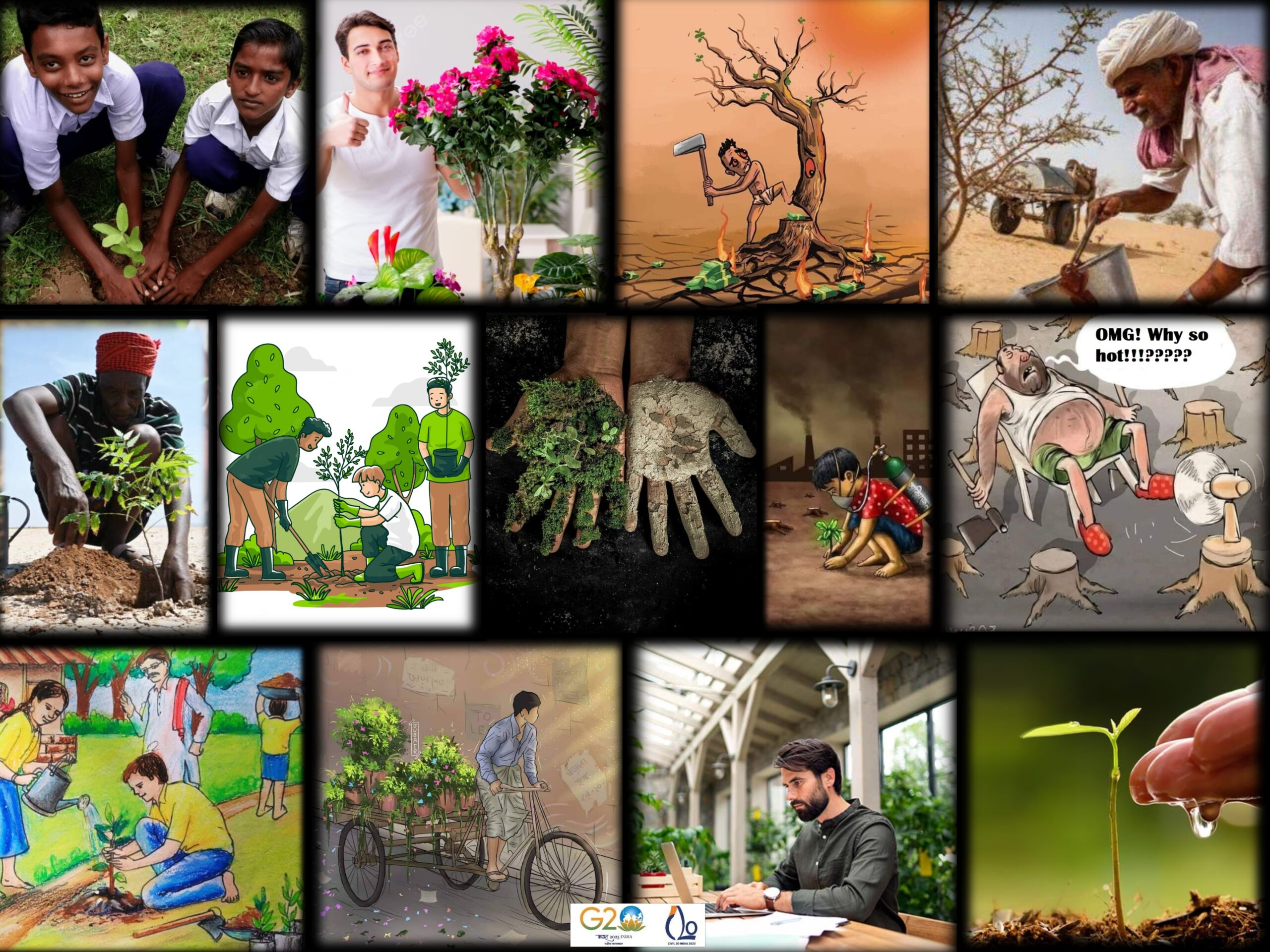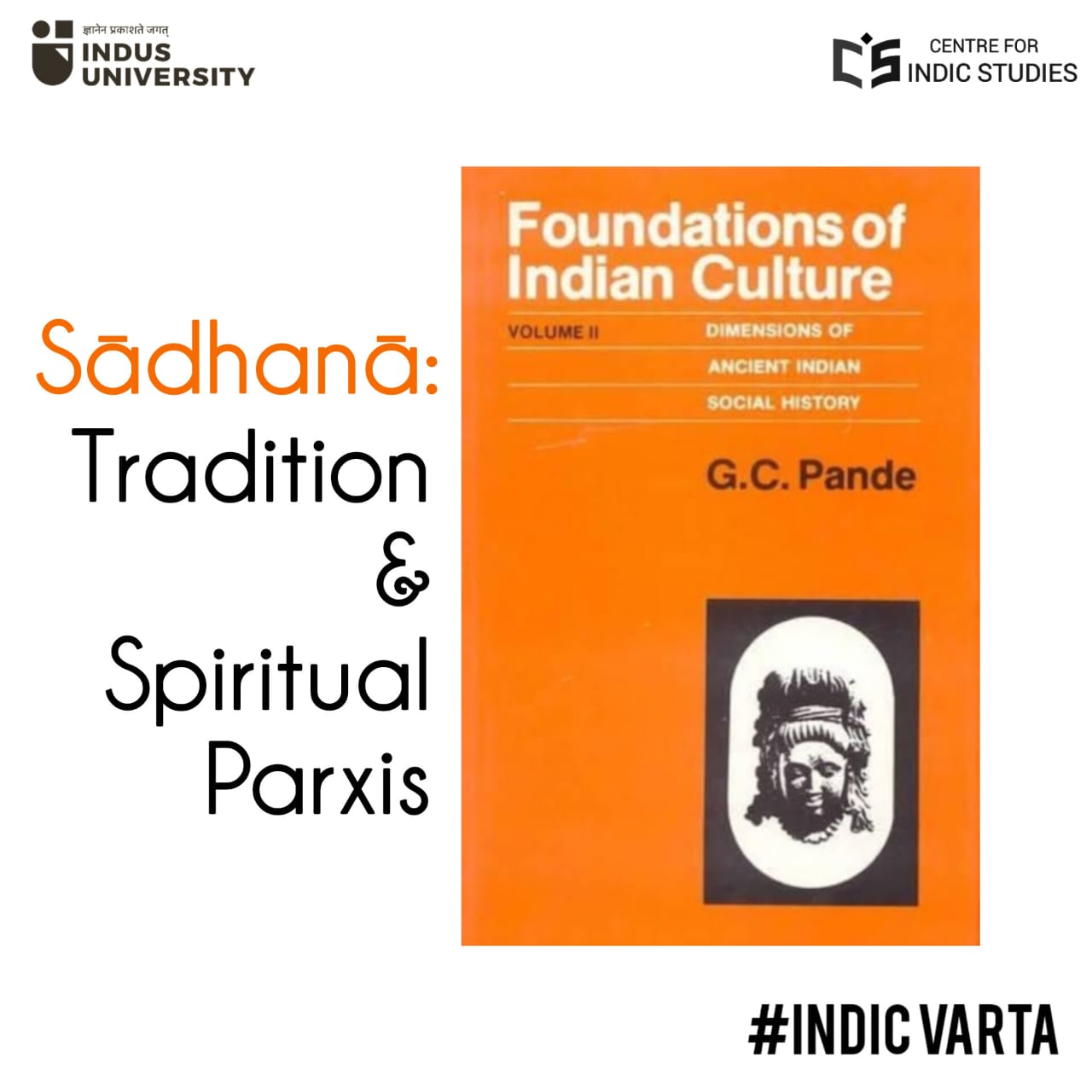- Visitor:101
- Published on:
Learn Values and Benefits of Tree Plantation from Padma Purana (C20_Indic Wisdom Series_Sustainable Lifestyle)
By planting and utilizing trees carefully and economically, we can sustain one of the greatest resources on earth. We must not forget that we have inherited this country with its many resources, from our ancestors. The ancient Hindus made their advancements, proving themselves to be a highly responsible community by protecting the Mother Earth’s fragile ecosystem, so that we, the future generations can have a place that we can safely call home. Let us look at what they have recorded in their scriptures or in other words, what our ancient texts demonstrate to realize the importance of tree plantation and then contribute to it. For this, the following piece highlights some specific parts of the grand Padma Purana.

- By planting and utilizing trees carefully and economically, we can sustain one of the greatest resources on earth. We must not forget that we have inherited this country with its many resources, from our ancestors. The ancient Hindus made their advancements, proving themselves to be a highly responsible community by protecting the Mother Earth’s fragile ecosystem, so that we, the future generations can have a place that we can safely call home. Let us look at what they have recorded in their scriptures or in other words, what our ancient texts demonstrate to realize the importance of tree plantation and then contribute to it. For this, the following piece highlights some specific parts of the grand Padma Purana.
The Planting of Trees
Bhima said:
1-2a. O brahman, tell me in detail about the rite (which is performed) with reference to (the planting of) trees. Also tell me about the worlds that are said (to exist).
Pulastya said:
2b-3. O King, I shall describe to you the rite with reference to the (planting) of trees in gardens and other places. O lord of the worlds, having accomplished everything as in the case of the rite with reference to the lakes, he should worship the priests, parts of the pavilion and also the preceptor like that (i.e. in the same way).
4-5. He should similarly honour brahmanas with gold, gar- ments and anointment. He should cover the trees with garments after having sprinkled them with water containing all herbs and with curds, and (after having) decorated them with curds and sacred grains. Their ears should be pierced with a golden needle.
6-8. He should also give (i.e. apply) collyrium to them with a small golden stick. He should also get fashioned seven or eight silver fruits; and should put each one of them on the altar (in the form) of the trees. Here the incense of guggulu is the best. O king, having filled pitchers with seven kinds of grains, having covered them with cloth, (having applied) sandal and anointment to them and having placed them in copper-vessels, he should put them on the trees.
9-10a. After worshipping them in the evening, and after properly making offerings to the regents of the quarters (and gods) like Indra, the brahmaņas should thus consecrate the trec.
10b-11. Then from the midst of the trees, he should give a cow covered with white cloth, with her girdle made of gold, her udders decorated with bell-metal and looking charming with golden horns and with her face turned towards the north.
12-15. Then the best brâhmaņas should bathe with (the water in) those very pitchers to the accompaniment of religious texts (used at the time) of holy bathing, and also of musical instruments and auspicious songs and also to the accompani-ment of sacred texts from the Rgveda, Yajurveda and Samaveda and texts sacred to Varuna. The host, having bathed and put on a white garment, should worship with grandeur, all the well- composed priests with (i.e. by giving them) cows, golden strings with bracelets, rings and sacred threads, as well as garments, beds, pieces of furniture and wooden sandals. For four days he should bathe with milk.
16. He should perform a sacrifice with ghee, barley or even with black sesamum. The sacrificial sticks of Palasa are recom-mended. Similarly a festival (should be celebrated) on the fourth day.
17-18a. He also should give presents (to brahmaņas) according to his capacity. He should, without being jealous, do whatever is most desirable. He should give double (the presents given to brahmanas) to the preceptor; and having saluted him, he should seek his pardon.
18b-19a. A wise man, who celebrates the tree-festival according to this rite, obtains (i.e. fulfils) all his desires, and an endless position.
19b-20. O lord of kings, he, who, thus installs (i.e, plants) a tree, would also live in heaven as long as three myriads of Indras (rule there); and would save (from falling into hell) past and future men (i.e. his relatives) equal to the number of hair on the body (i.e. a large number). 21-22. He attains great prosperity (making) rebirth diffi- cult. Even that man, who listens to this, or makes others to listen to it (i.e. reads it to others), is honoured by gods and in the world of Brahman. The trees alone make a sonless person have a son.
23-24. They offer libations etc. to plants at sacred places. O lord of kings, plant an afvattha tree even with great effort. It alone will give you a thousand sons. And by (planting) an alvattha a man becomes wealthy; the afoka (tree) destroys grief.
25. The plaksa tree is said to give (the fruit of) a sacrifice; the kşira tree is said to cause (long) life. Jambuki gives daughters; dadimi gives a wife.
26. Afvattha leads to the destruction of diseases; palāta gives (i.c. takes one to) Brahman. A man who plants a vibhitaka (tree) becomes a ghost.
27. (The planting of) Ankola tree leads to the expansion of the family. Health is (caused) by (the planting of) the khadira (tree). The sun is ever pleased with the nimba shoots. 28. God Siva (is pleased) when śri (tree is planted); and Parvati (is pleased) with the red lodhra (being planted). The celestial nymphs (are pleased) with (the planting of) simsapa, and the best Gandharvas with the kunda tree.
29. (One would get) groups of servants (if one plants) tintidika tree; similarly (the planting of) vanjula (leads to the rise of) robbers. Candana, and panasa also give religious merit and wealth.
30. (Planting of) campaka gives good fortune, and that of karira makes one an adulterer. (Planting of) täla destroys one’s progeny; while (planting of) vakula (i.e. bakula) expands the family,
31. The planting of coconut tree brings many wives, while planting of the grape-creeper (makes one have) an all-beautiful (wife). Similarly (planting of) kell causes sexual enjoyment; (planting of) ketaki destroys one’s enemies.
32. These trees and others which are not mentioned (here) are givers (of various objects). Those who have planted trees will go (i.e. attain) high position.

In Praise of Planting Trees
Vyasa said:
1. I shall (now) tell you what the fruit of (planting) trees is. O illustrious ones, listen to it. And also listen to the fruit derived from planting (trees) singly.
2. It is not possible to know or to narrate the meritorious fruit earned by that man who plants auspicious trees all round.
3. The fruit that a man would get by planting trees near water is a lakh crore times more than the fruit that he would get by planting them somewhere else.
4. He who plants it on the bank of a lake gets unending fruit. We say that hundredfold more is the fruit (that one gets) by planting meritorious trees.
5. A man does not obtain that fruit even by hundreds of sacrifices which he gets by planting an Afvattha (fig) tree on the bank of a pond.
6. The leaves (of the fig tree) falling in the water (of the pond) on the parvan’ days are like the rice balls offered to the manes and bear inexhaustible fruit.
7. The fruit (of the fig tree) are eatens by birds freely and like the food eaten by Brahmanas (at a śraddha) they give inexhaustible merit. 8. The fruit that one obtains by planting a fig tree fit to be eaten (exceeds) not only the fruit of performing a hundred sacrifices, but even of having a hundred sons.
9. In the hot (season) cows, deities, brâhmaņas receive shadow (from the tree). Eternal heaven is had by the hosts of the manes of the planter (i.e. the manes of the man who plants the holy fig tree live in heaven eternally).
10. Due to the holy fig tree being eternal there cannot be any difficulty that would befall the planter. Therefore, making all efforts a man should plant this holy fig tree.
11. By planting one tree a man is not abandoned (i.e. does not fall) from heaven. Therefore, O best brāhmaṇas, plant (this) great tree.
12-13. He who, the large-hearted one, plants trees like the holy fig tree near the charming vicinity of (reservoirs of) water, at the place where drinks are bought and sold, on the path or (near) a tank, goes to the lovely heaven after planting them. O brahmanas, I shall now tell you what merit (a man gets) by worshipping the holy fig tree.
14. He who touches the holy fig tree after his bath is free from all sins. He who without bathing touches it gets the fruit due from a bath.
15-16. By seeing it (i.e. when it is seen) it destroys sin; it gives wealth by (i.e. on) touching it. Long life would be (obtained) by going round it while keeping it to one’s right. (A man should recite the hymn;) “O holy fig tree, I always salute you. I always salute the holy fig tree whose leaves are shaking, in whom Visņu always resides, and who is fit (to be saluted).’
17. By offering (i.e. he who offers) to the holy fig tree oblations, water, an offering of eatables, flowers, incense, and lamp, one is not abandoned (i.c. does not fall) from heaven, 18. Remember that worship of the holy fig tree gives eternal wealth, prosperity and fame along with sons, as well as success and honour.
19. All that muttering (of hymns) done, all that offering made, all the hymns of praise sung, all mystical diagrams used as amulets and all sacred prayers etc. recited at the root of the holy fig tree is said to give the fruit which is crore times greater.
20. Who in the world would not worship it at whose root resides Vişņu, in whose middle part stays Siva, and at whose top lives Brahmå?
21. The fruit that one gets by observing silence, bathing and saluting the holy fig tree on a Monday or a new moon day is the same as is had by making a gift of a thousand cows.
22. By going round it, while keeping it to the right, the fruit that is obtained is (the same as obtained by giving away) a myriad of cows. By going many times round it while keeping it to one’s right the fruit is a lakh crore times greater; therefore one should always go round it while keeping it to one’s right.
23. Whatever, fruits, roots, water etc., is offered there (i.c. at its root), gives an eternal fruit in many births. 24-25a. Oh! there is no other form of Visnu on the earth like this tree-form, viz. the holy fig tree. As in the world a brahmana is adorable or cows and deities are adorable, so 15 the god in the form of the holy fig tree most adorable.
25b-26a. When it is planted, preserved, touched and worshipped, it always gives in (that) order, wealth, sons, heaven and salvation.
26b-27a. A man who makes cut in the body of the holy fig tree is born in the capdala and other (castes) after having suffered (i.e. lived in) a hell for a kalpa. 27b-28a. By cutting its roots he is never reborn (i.e. eternally lives in hell). Men stand (by) him in (the hell called) Raurava of a fearful sight.
28b-29a. That fruit which is (obtained) by planting (just) one holy fig tree is also obtained by planting three trees (i.e.. plants) of campaka and arka (i.e. the sun plant). 29b-30. The fruit of planting eight bilva trees, seven nyagrodha trees and ten nimba trees is the same. O brahmanas, I have told you the fruit obtained by planting each one of (these) trees.
31. He, a religious-minded man, who, knowing this, pre- pares an artificial forest (i.e. plants trees) goes to (i.e. lives in) heaven for crores of thousands and crores of hundreds of kalpas.
32-33a. (He gets the same fruit) by (planting) a thousand mango trees. Or he enjoys double or triple fruit or that which is smaller or greater (than that); and after having enjoyed it he would be made a king or a good lord.
3b-35. Enjoyable heaven, happy, lucky, auspicious king- dom, good health endowed with heroism come from (the construction of) a garden, the fruit (of the trees) of which are eaten by thousands of beings, birds, insects, or moths etc. that resort to them, or beings resorting to their shadows and other persons equalling that number.
36-38a. Hundreds of venerable deities become his servants. All the trees possessing vitality are of the form of deities. They should be worshipped as the manes (are worshipped), and should be served (as the manes are), and water and pindas should be offered (as they are offered to the manes). In every birth on the earth, they are born as his handsome and very modest sons.
38b. (In his house) auspicious and meritorious rites are always (performed). Thus the beings sticking to the mango tree become the lords of the attendants of Siva.
39. All the trees like emblic myrobalan, yellow myrobalan and others producing pungent, bitter and sour (fruits), become pure due to (their being planted in) a garden, give fruits, and always give ausp cious things.
40-43. Those who give (i.e. plant) trees go to that place where there are golden palaces adorned with all (kinds of) jewels, where there are aeroplanes resembling the wind (in speed), where the trees are full of gold and always give every- thing and give pleasure in all seasons, where the maidens rese- mbling celestial nymphs are intent upon singing and dancing, where there are tanks and other pools and also rivers having mud in the form of milk and decked with pure stones, having foam of milk, and endowed with the (objects of) six tastes.
44-45. He gets the same enjoyment in heaven as on the earth, and again (the same) on the earth; and again due to the old habit he constructs a tank or a garden. Doing such meri- torious deeds the man becomes the lord of heaven and of human beings. A man who is incapable (of constructing a tank) gets the fruit of constructing a tank by erecting a place to distri- bute water to travellers.
46. Here (ie. in this world) the quality of a place to distribute water to the travellers greatly removes all sins; it gives all enjoyments, is pure, is steady and gives (i.e. leads to) heaven and salvation.
47-49a. I shall narrate to you the characteristic (s) of a place to distribute water to the public, which enhances one’s fame. A man, who gives fragrant substances like agallochum, water, betel-nut with camphor, seat and tambula, after having erected temporary hall at a place where there is no water and which is mixed with the sounds (of people i.e. which is a crowded place) where many travellers come in summer, rainy season and even in autumn, does not fall from heaven. 49b-51a. If this is done for three years, the fruit (obtained) would be like that of (the construction of) a tank. He does not fall even from heaven, and is honoured even by gods. He who gives (water) at such a temporary hall for a month during summer when there is no (i.e. when there is scarcity of) water, would live in heaven for a kalpa, and fallen from heaven, is honoured (on the earth).
Constructing tanks, planting trees
Mahadeva said:
1-8a. Giving water is the best (gift); it is always the best of the gifts. Therefore, a man should get constructed oblong reser- voirs of water, wells and tanks. Wells dug for giving water destroy half the sin of a person of bad deeds, who is (later) always engrossed in good deeds. He from the reservoir of water dug by whom cows, brahmaņas, and good men always drink water, emancipates his family. (He too emancipates his family) in whose reservoir remains water in summer, which is never obtained in an inaccessible place and a place risky and difficult (to reach). I shall (now) tell you which are said to be the merits of the tanks that are constructed. He who has (constructed) a tank is honoured everywhere in the three worlds. The establishment of tanks is like a friendly house, increasing friends and friendship, producing fame and the best. A tank, which is well- constructed in a country, in a sacred place, and which is a great resort, is, the wise say, the fruit of dharma (righteousness), artha (worldly prosperity) and käma (sensual enjoyment). (While constructing) a tank, one should have in view the four kinds of beings.
8b-18a. All the tanks lead to excellent virtue. Gods, men, gandharvas, manes, snakes, demons and immobile beings resort to a tank. He in whose tank there is water in the rainy season, gets the fruit of maintaining the sacred fire. There is no doubt about it. He in whose (tank) there is water in the winter season, obtains the fruit of (the gift of) a thousand cows. There is no doubt. If there is water in his tank in the spring and summer seasons, the wise say, (he gets) the fruit of the Atiratra and horse-sacrifice. Now listen to the merits of planting trees. He who plants them would emancipate both the families (of his father and of his mother), O great sage. Therefore, a man should plant trees. There is no doubt that these trees become (his) sons and grand- sons. He too, when he dies, obtains inexhaustible worlds. The trees worship all the hosts of gods with flowers, the manes with leaves, and all guests with their shadow. Kinnaras, serpents, demons, gods, gandharvas, men, so also hosts of sages resort to trees. They, having flowers and fruits, gratify human beings in this world. Here and in the other world, they are the legal sons.
18b-26. Those brāhmaṇas who (construct) tanks, who plant trees and who have performed sacrifices, do not go away from heaven, so also others who tell the truth. Truth alone is the highest Brahman. Truth alone is the highest penance. Truth alone is the greatest sacrifice. Truth alone is the greatest know- ledge. Truth is awake among gods; and truth is the highest posi- tion. Penance, sacrifices, religious merit, so also worship of deities and guests, the first precept, knowledge-all this is settled in truth. Truth is sacrifice; so also it is charity. It is the hymns. It is goddess Sarasvati. Truth is practising a vow. Omkara also is truth. Wind moves due to truth. The sun shines due to truth. Fire burns because of truth. Heaven exists on account of truth. Worship of all gods, bathing at all holy places, are said to be truth. (A truthful man) undoubtedly obtains everything in the world. If a thousand horse sacrifices and truth are compared, truth certainly is superior to all (kinds of) sacrifices. Gods, manes and sages are pleased by means of truth. They say, truth is the highest duty. They say, truth is the highest position.
Note:
[Svah: is one of the seven worlds viz. Bhah, Bhuvab, Svab, Mahab, Jana, Tapas and Satya.
Karpatedhana-car-boring; a religious ceremony sometimes performed as a samskära.
Tala: Planting of this tree is said to destroy children and that of bakula to increase the family
Parvan-The days of the four changes of the moon, i.e. the eighth and fourteenth day of each half month, and the days of the full and new moon.
Bodhisattva, like Caladdala, is one of the names of the holy fig tree
Ahamkara, Pradhana and Purusa are principles accepted by the Sta school of philosophy. For a detailed description of these, see Chapter 2 above
Pakaganya-the five products of the cow taken collectively, viz.milk, curds, clarified butter or ghee, urine and cowdung.
Kotact-an epithet of the goddess Durga.]
Bibliography:
Padma Puran, Gita Press, Gorakhpur
Padma Purana, Shristikanda, Chapter 28
Padma Purana, Shristikhanda, Chapter 58
Padma Puran, Uttarakhand, Chapter 27
Center for Indic Studies is now on Telegram. For regular updates on Indic Varta, Indic Talks and Indic Courses at CIS, please subscribe to our telegram channel !
- 50 min read
- 0
- 0










